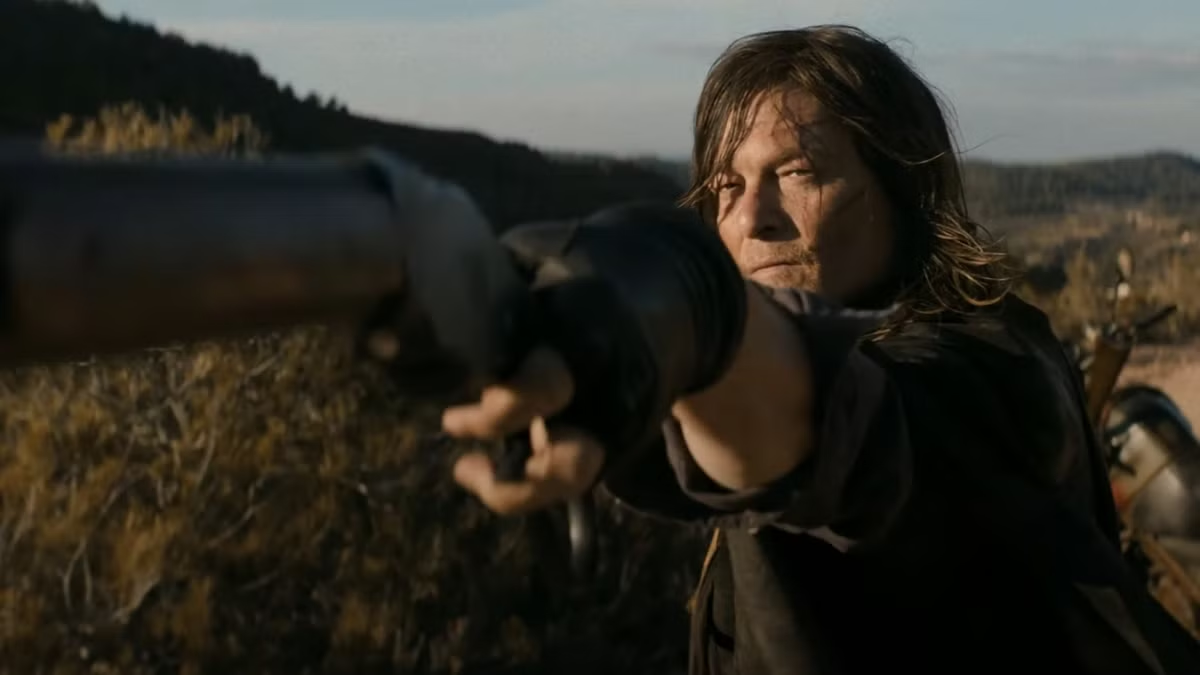TL;DR: Carol deserves better, Daryl deserves rest, and Fede deserves a rewrite. “Controbando” isn’t terrible — it’s just tired. The apocalypse has never felt this safe, and that’s the real tragedy.
The Walking Dead: Daryl Dixon season 3
There’s a strange comfort in watching The Walking Dead still shambling on after all these years. It’s like running into an ex who’s taken up mindfulness and wine-tasting — familiar, a little different, but still nursing the same trauma underneath. AMC’s undead empire has mutated more times than its own walkers, stretching from Georgia farmlands to Parisian catacombs, and yet, it always comes back to the same bittersweet rot: survival at the cost of everything that once made us human.
So here we are again — Season 3, Episode 6 of The Walking Dead: Daryl Dixon, an hour that’s supposed to be the penultimate crescendo of a show that promised to redefine what this world could be. Instead, we got “Controbando,” an episode that’s as emotionally earnest as it is dramatically flat. The apocalypse has never looked so lethargic.
And the worst part? It’s not the acting (because Melissa McBride could cry over a burnt Pop-Tart and make me sob with her). It’s not even the budget or the pacing. It’s the villain. Fede — a man so blandly menacing he makes the Governor look like Shakespearean tragedy — might just be The Walking Dead’s weakest attempt at evil yet. He’s the soggy breadstick of bad guys: all texture, no flavor.
But before I get too deep into that (and believe me, I will), let’s back up. Because even in this uneven mess of moral lessons and awkward chemistry, Daryl Dixon still has flashes of something great — fleeting moments that remind you why this show still exists, why Norman Reedus keeps revving that metaphorical motorcycle of melancholia, and why we can’t quite let these characters die.
At this point in the season, we should feel like the world is collapsing. The French spin-off premise — this idea of rebuilding in an old world that’s already crumbling — has always been the best part of Daryl Dixon. It gave us a visual freshness, a poetic detachment from the southern grit of the original show. Parisian ruins. Monastic hope. Wine cellars doubling as bunkers. The atmosphere was intoxicating — literally and narratively.
But “Controbando” is what happens when that gorgeous ruin starts to feel like wallpaper. The apocalypse no longer breathes; it just kind of poses. Every frame looks like concept art for a game I want to play, but the plot moves like molasses. Daryl and Paz’s road trip across the wasteland could’ve been a gritty, soulful trek — The Last of Us with less cordyceps and more Catholic guilt — but instead, it’s an oddly mechanical sequence of “go here, shoot that, feel something.”
And poor Carol. My beautiful, trauma-hardened queen. She’s reduced to romantic subplots and exposition delivery. Watching her flirt nervously with Antonio feels like watching your cool aunt get stuck in a Hallmark zombie movie. She deserves better than a story arc that reads like, “woman rediscovers sensuality through light boat maintenance.”
Still, I can’t be too harsh. Melissa McBride brings something luminous to every frame she’s in. She could be silently folding apocalypse laundry and it would still be layered with decades of pain and small, exhausted hope. Her relationship with Antonio — though awkwardly scripted — has emotional honesty buried somewhere under the clichés. It’s a flicker of connection in a story that’s mostly running on fumes.
Here’s the thing: The Walking Dead has always lived and died (pun intended) by its villains. From Shane’s tragic descent into self-preservation to Negan’s barbed-wire charisma, the best arcs came from characters who complicated morality. They were the mirror we didn’t want to look into. Fede, however, is not that mirror. He’s a bathroom selfie with the flash on.
He’s got motive — sure, sort of. He’s corrupt, paranoid, maybe guilty of poisoning his own son. But the performance and writing give us no texture, no internal logic that makes his cruelty sting. He’s a plot device in a tailored jacket. Even when he’s confronted, it’s not terrifying; it’s tedious. The moment Carol threatens him feels like a teacher scolding a student for forgetting homework, not a rebellion against authoritarian rot.
And in a show that once gave us cannibal cults, whispering skin-wearers, and fascist city-states, it’s just… depressing. Fede’s villainy is the equivalent of a villain monologue read through a PowerPoint presentation.
When Antonio finally stands up to him — in what should’ve been a cathartic moment — it lands with a whimper. The stakes feel nonexistent because the episode never convinces us that this man could win. It’s like watching a chess game where one player keeps apologizing for moving pieces wrong.
The result? The central tension evaporates. Without a real threat, every emotional beat feels like a rehearsal for a story we’re not actually being told.
Let’s talk about Daryl. I’ve loved this man for so long I should be getting residuals. When The Walking Dead first started, he was chaos incarnate — a junkyard dog with a crossbow and more emotional repression than a whole generation of Tumblr users. Over the years, he became something deeper, sadder, tender in that way only men who’ve seen too much violence can be.
But here? He’s tired. Not just Reedus — Daryl as a character feels narratively spent. His scenes with Paz are fine, but they lack the intensity or even the quiet intimacy that made his interactions with Carol or Connie or Beth sing. It’s all mission, no meaning. When he dreams of his childhood abuse, it feels like the writers trying to inject old pain into new wounds, but it doesn’t land. It’s a callback without resonance — nostalgia without revelation.
And that’s the crux of this whole episode: it’s obsessed with echoes. It wants to sound like old Walking Dead, but the acoustics are off. You can hear the desperation in the dialogue, the way characters say things that sound deep but collapse under scrutiny.
Every time Carol gets a quiet moment, the series wakes up for a second. Watching her learn Spanish, laugh again, or sneak through the shadows for stolen medicine feels like glimpses of the woman we know — the one who’ll burn a kingdom to protect a child. But this time, she’s softer. Sadder. Maybe even lonely.
There’s a recurring visual motif of reflection — mirrors, glass, film reels — that reminds us she’s living in the aftermath of her own survival. She’s not trying to win anymore; she’s trying to feel something other than guilt. And that’s beautiful, thematically. The issue is that the show doesn’t trust it. Every time Carol starts to find something tender, the narrative yanks her back into a poorly constructed conspiracy or another half-baked threat.
Antonio’s tragic backstory could’ve been the emotional core of the episode. His guilt over his wife’s death, his cowardice under Fede’s control, his attempts to reconnect with his son — all of that could’ve tied beautifully into Carol’s own haunted motherhood. Instead, it plays like a subplot from a soap opera that wandered into a zombie set.
Still, there’s one scene that almost redeems it: the kiss. Carol and Antonio’s hesitant, tear-streaked kiss feels like two ghosts remembering what warmth feels like. For one second, it’s not about the apocalypse or survival. It’s about grief making room for love again. It’s one of the rare emotional beats that lands. And then — predictably — the show drops it, never exploring the fallout.
You’d think by now, The Walking Dead would’ve mastered the art of kinetic despair — the way violence and chaos can dance with meaning. But the action sequences in “Controbando” feel perfunctory, like contractual obligations.
The rescue attempt, the gunfights, even the grenade launcher moment — they’re filmed with competence but no imagination. The choreography’s fine, but there’s no pulse. Compare that to earlier Daryl Dixon episodes, where every explosion or walker attack felt personal, like the world was trying to chew through the characters’ souls.
Now it’s just set dressing — a background hum of danger that never really threatens anyone. Even the walkers feel disinterested, as if they, too, are tired of chasing the same people through the same emotional swamps.
The best action moments in this universe have always been about revelation. Rick biting out Joe’s throat. Michonne’s katana ballet. Carol’s terminus massacre. Each of those moments redefined character through violence. Here, the violence just fills time.
I can’t help but feel the phantom ache of what The Walking Dead once was. Remember the moral chaos of Season 5? The nihilism of Season 7? The quiet, meditative apocalypse of Season 9? This spin-off once promised to be something closer to the latter — atmospheric, emotional, European in its melancholy. But as we approach the end of Season 3, that promise feels hollow.
Maybe it’s fatigue — the creative kind. Maybe it’s the result of too many spin-offs cannibalizing the same DNA. But The Walking Dead: Daryl Dixon feels like a show haunted by its own legend, unable to move forward or meaningfully look back.
There’s still beauty in it — cinematography that captures decay with painterly restraint, a score that hums like ghost machinery, performances that deserve better scripts. But the world itself feels static. The characters are survivors without arcs, ghosts pretending to be alive.
If I had to pinpoint why “Controbando” doesn’t work, it’s because it mistakes plot for progress. Things happen — rescues, betrayals, confessions — but nothing changes. Daryl’s still stoic. Carol’s still searching. Fede’s still terrible.
In a universe that once thrived on transformation — on watching people evolve under unbearable pressure — that’s a death sentence. It’s not that the show has lost its sense of horror. It’s lost its sense of consequence.
That final flashback, showing Antonio’s wife dying in a bombing and the first walkers rising from body bags, could’ve been chilling. It could’ve reframed everything we’d seen — the origin of Antonio’s trauma, the seed of his moral paralysis. But the moment is buried under sentimentality. The editing is clumsy, the pacing abrupt, and instead of haunting, it just kind of… ends. Like a bad dream fading before it gets scary.
I’ll admit it: I’m still here because I love these characters too much to quit. Daryl and Carol’s bond is one of television’s most enduring, unspoken love stories — part friendship, part trauma bond, part post-apocalyptic twin flame. Whenever they share the screen, even for a moment, the air changes. The world feels less dead.
So yes, I’ll keep watching. Not because the episode earns it, but because I’ve spent too long walking beside these ghosts to stop now. And maybe that’s what AMC is banking on — the emotional sunk cost of fans like me, still searching for closure in a world that refuses to end.







